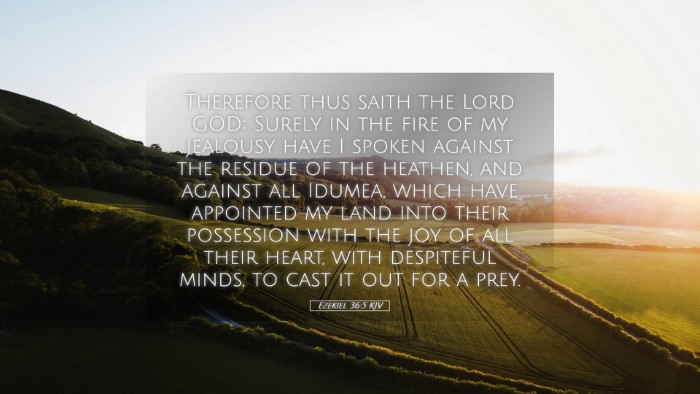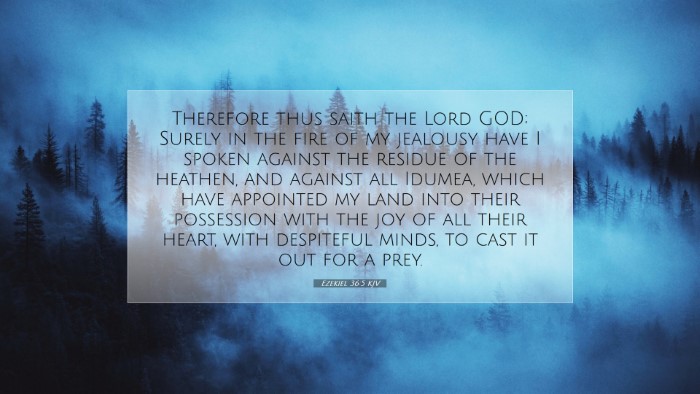Commentary on Ezekiel 36:5
In Ezekiel 36:5, the Lord declares His intention to bring judgment upon the nations that have long opposed His people. This verse encapsulates the theological themes of divine wrath, redemptive sovereignty, and the ultimate restoration of Israel.
Contextual Background
The context of Ezekiel 36 reveals a profound message of hope following a period of judgment. The nation of Israel had faced severe consequences due to its unfaithfulness and idolatry. The surrounding nations had rejoiced in Israel's downfall, considering it a validation of their own gods.
Verse Analysis
Ezekiel 36:5 states:
“Therefore thus says the Lord God: Surely I have spoken in my burning jealousy against the rest of the nations and against all Edom, who gave my land to themselves as a possession, with wholehearted joy and utter contempt, that they might plunder its open country.”
Divine Jealousy
Matthew Henry explains that the term "burning jealousy" is indicative of God's deep emotional response to the dishonor shown to Him by the nations. Such jealousy reflects His desire for His glory and the sanctity of His name. It underscores the relational aspect of God’s character—He is deeply invested in the reputational integrity of His covenant people.
Judgment on the Nations
In this verse, God specifies that His wrath is directed not merely at Israel, but at other nations, particularly Edom. Albert Barnes notes that Edom’s historical enmity against Israel makes them a prime target for divine judgment. The mention of Edom serves as a reminder of the interconnectedness of God’s justice across all nations, affirming that transgressions against God's people warrant repercussions.
God's Sovereign Rights over the Land
This verse emphasizes God's ownership of the land of Israel. Adam Clarke points out that the actions of the nations were not just political; they were a direct affront to His authority. The Lord asserts His right to adjudicate what happens within the promised land. The phrase “gave my land to themselves as a possession” signifies blatant usurpation, spurred by pride and contempt for God’s chosen people.
Implications for the People of God
This proclamation in Ezekiel provides profound implications for the people of Israel and for contemporary believers. Both Henry and Barnes emphasize that this stirring declaration serves as a dual reminder of God's justice and mercy. While He is just in holding nations accountable, He is also merciful, as He is in the process of restoring His people. This duality is essential in grasping the character of God—He does not overlook injustice but also seeks to restore and redeem.
Encouragement in Difficult Times
For pastors and theologians, this text offers encouragement in preaching the themes of God’s justice and restorative work. Clarke highlights that despite the dire circumstances surrounding Israel, God’s ultimate plan is restoration, serving as a beacon of hope. This assurance can be influential in facilitating pastoral discussions around suffering, justice, and God’s unchanging nature.
Theological Reflections
- Divine Sovereignty: The verse affirms the sovereignty of God over nations and history. It serves as a reminder that no authority is beyond God’s oversight.
- The Nature of Divine Jealousy: It invites reflection on the nature of God’s jealousy—not as petty jealousy but as a passionate concern for holiness and covenant fidelity.
- Covenantal Faithfulness: It reinforces the assurance that God remains faithful to His covenant relationships, even despite human unfaithfulness.
Conclusion
Ezekiel 36:5 is a powerful reminder of God's righteous anger against those who oppose Him and His people, alongside His unwavering commitment to restore and elevate His chosen ones. For modern believers, this passage serves both as a warning against idolatry and as an assurance of God’s relentless mercy and sovereignty in the face of adversity.


